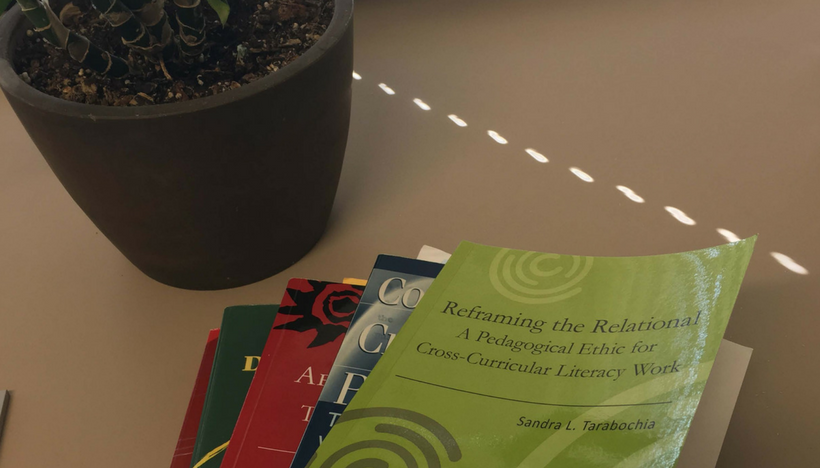This post is written by member Sandra L. Tarabochia.
Twelve years ago, my first year in graduate school, I was invited to collaborate with the chair of the Biology Department. Frustrated with the writing students produced in his class, the chair hired me to co-teach a first-year honors seminar for non-majors. He would teach the content and I would teach his students to write.
The experience was challenging and invigorating. I was just beginning to learn about my field, Composition and Rhetoric, newly exposed to a rich body of research about writing and learning to write, as I was faced daily with the task of sharing, translating, and making relevant my growing understanding in another disciplinary context.
At the same time, working with the chair and his students shaped how I made sense of my discipline. Their assumptions, questions, needs and perspectives created useful tensions that forced me to embrace a telescoping view of my field and its knowledge as I moved back and forth across disciplinary contexts.
I became fascinated by the complexity of cross-disciplinary communication and collaboration around writing—what I now see as cross-curricular literacy (CCL) work. Rooted in that scholarly interest, Reframing the Relational: A Pedagogical Ethic for Cross-Curricular Literacy Work investigates how writing specialists and teachers in other disciplines talk about teaching writing. Chapters draw on conversation transcripts and interviews with research study participants—five groups from four post-secondary institutions—to identify communication strategies and habits of mind for navigating key challenges and opportunities in CCL work: negotiating expertise, orienting to change, and embracing play.
Reframing the Relational guides literacy educators to rethink the countless conversations we have with people who don’t always see reading and writing the way we do. Imagine a passionate discussion among fellow English teachers in your department, curriculum planning on an interdisciplinary team/committee, conversations with assessment experts about how to “measure” literacy development, calls with parents frustrated about student progress, building relationships with co-teachers, mentors, or mentees. Each of these situations invites us to negotiate expertise, orient to change, and embrace play to communicate meaningfully about literacy teaching and learning. This book empowers educators to learn from the complexity of these moments, to consider concrete rhetorical strategies and mindsets in relation to our individual goals and experiences, to see in our daily conversations about literacy learning the potential for pedagogical relationship building.
The book uses pedagogy as a framework for understanding CCL conversations. Unlike traditional views of pedagogy as classroom-based, one-directional transactions from teacher to student, pedagogy is understood as ongoing collaborative inquiry among teacher-learners in a range of contexts (Gallagher, 2002; Kameen, 2000; Lee, 2000; Qualley, 1997). Inspired by Shari Stenberg’s (2005) Professing & Pedagogy, the framework features three dimensions: 1) pedagogy is epistemic—a matter of knowledge building rather than transmitting or translating; 2) pedagogy is reflexive—involves reflecting on (and sometimes revising) assumptions when confronted with new people and perspectives; and 3) pedagogy is relational—evolves from each unique encounter among complex subjects and subject matter.
This framework encourages new ways of perceiving and responding to tough conversations about literacy learning. For example, I examine the pedagogical potential of play. In one case Frank, a writing specialist, and Chuck, a computer science professor teaching a first-year seminar on 1980’s music and culture, developed a playful concert metaphor to explore the complex relationships between students, professor and peer writing tutor assigned to Chuck’s course.
The metaphor worked pedagogically on cognitive and relational levels, allowing the two to collaboratively make meaning and connect over the shared experience. More abstractly, Frank and Chuck sang together as they compared Bruce Springsteen’s version of “Dancing the Dark,” which came up in Chuck’s course, and the Ray Conniff version with which Frank was familiar. Their boisterous crooning defied expectations for a professional meeting in Frank’s office, a transgression play theorists suggest can stimulate psychological arousal associated with learning through play. The book examines these and other instances of play to determine how conversation partners can more purposefully employ pedagogical play to enhance communication about literacy learning.
In a similar vein, Reframing the Relational investigates how participants negotiated expertise through strategic pronoun use and matchmaking, highlighting the importance of collaborative meaning-making. It also reconceptualizes change as transformative learning (Mezirow, 1991), asking: What would it mean to see resistant partners in conversations about literacy learning as learners themselves, wrestling productively with troublesome knowledge (Meyer, Land, and Baillie, 2010; Perkins, 2006)? What would it mean to see ourselves the same way? The book examines conversational clues that speakers are approaching learning thresholds and identifies strategies for supporting and joining in that learning.
Ultimately, Reframing the Relational generates new understandings of the communication challenges and opportunities that enable and constrain conversations about (teaching) writing. It offers literacy educators adaptable strategies and flexible habits of mind for communicating about teaching and learning and for embracing the pedagogical potential of the cross-curricular literacy interactions we encounter every day.
 Sandra L. Tarabochia is assistant professor of English at the University of Oklahoma. Tarabochia’s research lives at the intersection of writing, teaching, and learning. Her current project investigates the learning trajectories of early career faculty writers.
Sandra L. Tarabochia is assistant professor of English at the University of Oklahoma. Tarabochia’s research lives at the intersection of writing, teaching, and learning. Her current project investigates the learning trajectories of early career faculty writers.
https://ou.academia.edu/SandraTarabochia
Note: Members will receive a 20% discount and free shipping for Reframing the Relational: A Pedagogical Ethic for Cross-Curricular Literacy Work until December 31 by using the code THANKFUL2017.

